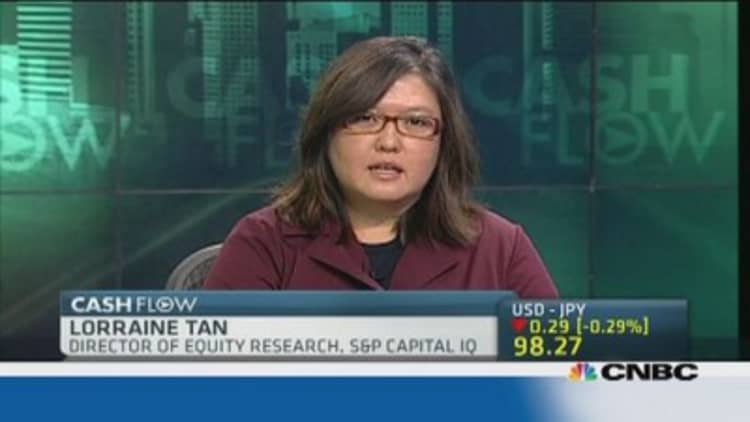Despite the rise in China's consumer prices to a seven-month high in September, economists say that inflation doesn't pose a risk for the world's second-largest economy.
The consumer price index (CPI) rose 3.1 percent in September, well above expectations for a 2.8 percent rise, and higher than August's 2.6 percent rise.
The rebound in the index was primarily driven by food prices, vegetables in particular, on strong demand during the mid-Autumn festival and weather-related disruptions. Food prices rose 6.1 percent in September, compared with 4.7 percent in the previous month.
(Read more: China's September exports in surprise slump)
"I'm not worried about inflation, core inflation remains pretty low. At times, we have had a pickup in inflation because of vegetable prices, but these bouts of inflation tend to be short," said Louis Kuijs, chief China economist of the Royal Bank of Scotland.
"Times that we have seen more pronounced food-price-driven inflation episodes, like in 2005 [and] 2007-2008, have always been when global commodity prices have risen rapidly - when things like soybeans, rice and corn rice rise, and feed into higher pork prices. We don't have that context," he said.

Economists expect that inflation will remain within range of the government's 3.5 percent target in the coming months and is unlikely to trigger any change in the People's Bank of China's monetary policy stance.
"Looking forward, CPI inflation could tick up further in the fourth quarter mainly on base effects, but the chance for exceeding 3.5% might still be low," said Ting Lu, Xiaojia Zhi, China economists at Bank of America Merrill Lynch.
Producer prices, meanwhile, provided some encouragement as deflation continued to dissipate in September, reflecting stabilization in raw material costs and re-stocking by manufacturers. The producer price index (PPI) fell 1.3 percent in September, narrowing further from a 1.6 percent decline in August.
(Read more: Chinese envy the US government shutdown)
"This improvement indicates that re-stocking has begun in earnest, at least with a number of upstream industries. Then the question is how long it could last if the momentum of infrastructure investment were to be dampened by limited credit easing," said Wei Yao, China economist at Societe General.
The outlook for China's economy was called into question again this weekend after the trade data showed exports unexpectedly contracting by 0.3 percent in September.
While many economists say this is no reason to panic given the volatility of monthly trade numbers and a high base for comparison due to the over-reporting of exports data between late 2012 and April 2013, Zhiwei Zhang, chief China economist at Nomura believes the data is a sign that growth momentum may have started to lose steam.
(Read more: China wonders: Why do we own so much U.S. debt?)
"These data support our view that growth peaked in third quarter and will resume a downward trend upon the withdrawal of policy supports," Zhang said.
Macro-economic data due out on October 18, including third quarter gross domestic product (GDP) and industrial production, will provide further insight into the health of the economy. GDP growth is expected to have picked up in the July-September quarter to 7.8 percent, from 7.5 percent in the previous three months.
—By CNBC's Ansuya Harjani; Follow her on Twitter @Ansuya_H


